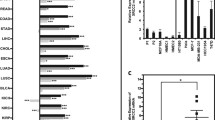Abstract
Mammalian degenerin (MDEG) is a member of the amiloride-sensitive sodium ion channel family, and its site-directed active mutant (MDEG-G430F) induces massive Na+ influx into cells, leading to cell ballooning and cell bursting. We attempted a novel therapeutic approach for gastric cancers by transferring MDEG-G430F into cancer cells using tumor-specific promoters. In carcinoembryonic antigen (CEA)-producing gastric cancer cells, the level of cell death observed when MDEG-G430F was used with a CEA promoter was similar to that observed when using a potent nonspecific promoter such as the cytomegalovirus promoter. In an in vivo study, fusogenic liposome complexes containing MDEG-G430F driven by the CEA promoter were injected intraperitoneally into CEA-producing gastric cancer cells in a mouse peritoneal dissemination model. Although all 15 of the control mice were dead by 50 days postinoculation, 13 of the 15 mice treated with MDEG-G430F survived. These results indicate that transferring MDEG-G430F into cancer tissues using tumor-specific promoters can achieve striking and selective cancer cell death irrespective of the transcriptional efficiency of the promoters used in vivo, and suggest that this approach is a promising new strategy for cancer gene therapy.
Similar content being viewed by others
Author information
Authors and Affiliations
Rights and permissions
About this article
Cite this article
Horimoto, M., Sasaki, Y., Ugawa, S. et al. A novel strategy for cancer therapy by mutated mammalian degenerin gene transfer. Cancer Gene Ther 7, 1341–1347 (2000). https://doi.org/10.1038/sj.cgt.7700249
Received:
Accepted:
Published:
Issue Date:
DOI: https://doi.org/10.1038/sj.cgt.7700249
- Springer Nature America, Inc.
Keywords
This article is cited by
-
Calcium in tumour metastasis: new roles for known actors
Nature Reviews Cancer (2011)




